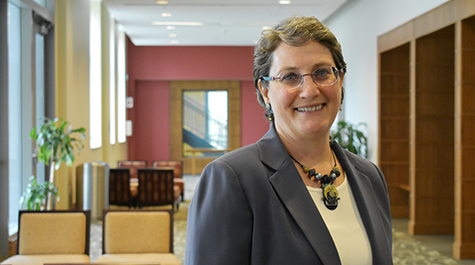Tschannen-Moran named among 20 most influential scholars in field of school leadership
A recent article in the Review of Educational Research has named Professor Megan Tschannen-Moran among the top 20 most highly-cited authors in the field of educational administration. This review analyzed the output of 22 international journals about K-12 school leadership and used a “bibliometric” methodology to assess citations and co-citations of research in the field from 1960 to 2018.
Tschannen-Moran’s work was placed at #12 on their list of most highly-cited authors in that time frame. Most of the other scholars listed began publishing at least a decade earlier than Tschannen-Moran.
“The other names on the list are some of the most highly-recognized and influential people in the field,” said Tschannen-Moran. “To be in the company of these people is very humbling.”
Tschannen-Moran has taught at William & Mary since 2000. Her research focuses on the critical importance of trust among teachers, administrators, parents and students.
Tschannen-Moran began her career in education as founder and principal of a small, progressive, inner-city school in Chicago. Despite being located in a neighborhood known for violence, the school’s community flourished.
“We were strapped for resources and our children couldn’t walk safely to school, but inside its walls, we had such a supportive and trusting community,” she said.
Wanting to study more deeply what made that school such a special place, she started graduate school at The Ohio State University and studied under Wayne and Anita Hoy, whose research centered around school climate and teacher self-efficacy. Together, they developed a measure of self-efficacy, or how much teachers believe they have the capability to succeed and make a difference in students’ lives.
“I could have done my dissertation on self-efficacy, but I knew there was something else that was making a difference in my school in Chicago. It was the high level of trust between administrators, teachers, parents and students. I knew I had to pursue this idea.”
With very little existing research on trust in education, Tschannen-Moran had to look to other disciplines such as philosophy, psychology and business.
“The philosopher Annette Baier observed that we tend to notice trust as we notice air, only when it becomes scarce or polluted,” she said. “With the accountability movement and other societal shifts in the 1980s and 1990s, the level of trust in schools had eroded. That lack of trust severely hampers our ability to be successful.”
Her research led to numerous journal publications and a book, Trust Matters: Leadership for Successful Schools, which was first published in 2004, with a second edition published in 2014.
“Trust is only critical in situations of interdependence, when people are working together on a shared outcome. Education is just such a situation — none of us is educating our students alone, so the question of whether we trust the other people involved in the education of our students is of great consequence.”
As individuals make decisions about whether or not to trust another person or institution, Tschannen-Moran posits that they base those decisions on judgments about their benevolence, honesty, openness, reliability and competence.
“When there’s an absence of trust, people invest their energy in self-protection. It’s a state of hypervigilance in which energy is directed away from the collective work of education,” she added.
While her book Trust Matters focuses on how school leaders can foster a sense of trust in their schools, she hopes to write a parallel book for teachers. “After 25 years studying trust, I’m convinced that the most important trust relationship in education is the one between teachers and their students. In the classroom, trust is vital because genuine learning requires risk. If students don’t feel safe or feel a sense of distrust, they pull back into a stance of self-protection that hampers the learning process. Trust is important for teachers as well because although teachers are in a position of power, they are also in a position of vulnerability.”
In addition to her work on trust, Tschannen-Moran has also conducted research on teachers’ self-efficacy beliefs and the collective efficacy of teachers in a school, as well as the self-efficacy of school leaders. These beliefs about their individual and collective capability to successfully educate the students in their care are closely tied to the motivation and persistence that educators bring to their work. Thus, they are closely tied to the outcomes a school can achieve.
School climate is another line research Tschannen-Moran has pursued. Working with a team of doctoral students, she developed the Vibrant School Scale, a measure that captures the dynamics of enlivened minds, emboldened voice, and playful learning in schools.
Tschannen-Moran also developed the evocative coaching model with her husband Bob, a business and life coach. They have co-authored two books on the topic.
Despite her success in the field, Tschannen-Moran was surprised to learn last year that she was the second most cited faculty member at William & Mary. Ufuk Erdogan, a visiting scholar at the School of Education, discovered this fact poking around in Google Scholar.
“It’s an honor to receive these recognitions, but I don’t do this work to keep score,” she said. “I do it because I love it.”
